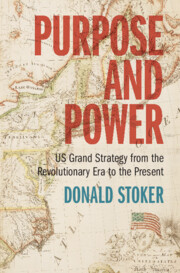Book contents
- Purpose and Power
- Purpose and Power
- Copyright page
- Dedication
- Contents
- Figures
- Maps
- Abbreviations
- Thinking about Grand Strategy in Peace and War
- Part I From Backwater to Great Power
- Part II From Great Power to Superpower
- 7 Stepping upon the Global Stage, 1913–1921
- 8 The Interwar Interlude, 1921–1939
- 9 Moving Astride the World: The Second World War, 1939–1945
- 10 The Hot Peace and the Korean War, 1945–1953
- 11 The Hot Peace: The Eisenhower, Kennedy, And Johnson Years, 1953–1969
- 12 The Vietnam War, 1961–1969
- 13 Détente and Defeat: Nixon, Ford, and Vietnam, 1969–1977
- 14 For Want of a Vision: The Carter Years, 1977–1981
- 15 Winning the Hot Peace: Reagan’s Great-Power Competition, 1981–1990
- Part III The Post–Cold War World
- Part IV Retreat and Defeat
- Acknowledgements
- Notes
- Index
7 - Stepping upon the Global Stage, 1913–1921
from Part II - From Great Power to Superpower
Published online by Cambridge University Press: 11 January 2024
- Purpose and Power
- Purpose and Power
- Copyright page
- Dedication
- Contents
- Figures
- Maps
- Abbreviations
- Thinking about Grand Strategy in Peace and War
- Part I From Backwater to Great Power
- Part II From Great Power to Superpower
- 7 Stepping upon the Global Stage, 1913–1921
- 8 The Interwar Interlude, 1921–1939
- 9 Moving Astride the World: The Second World War, 1939–1945
- 10 The Hot Peace and the Korean War, 1945–1953
- 11 The Hot Peace: The Eisenhower, Kennedy, And Johnson Years, 1953–1969
- 12 The Vietnam War, 1961–1969
- 13 Détente and Defeat: Nixon, Ford, and Vietnam, 1969–1977
- 14 For Want of a Vision: The Carter Years, 1977–1981
- 15 Winning the Hot Peace: Reagan’s Great-Power Competition, 1981–1990
- Part III The Post–Cold War World
- Part IV Retreat and Defeat
- Acknowledgements
- Notes
- Index
Summary
Woodrow Wilson produced one the greatest changes in American strategic history: America would now go abroad to establish democratic governments. He was also America’s most interventionist president and commonly used American military power to force Latin American nations to behave as he thought they should. Wilson fought wars in Haiti and the Dominican Republic, and two against Mexico, and sent troops into Cuba. He most famously took the US into the First World War because of German unrestricted submarine warfare against merchant shipping and the Zimmerman Telegram. Wilson sought a democratic German government and to create a stable peace, but he was reluctant to consider the aims of the other Allied coalition nations, Britain, France, and Italy. The US was unprepared to enter the First World War but built an enormous army under John J. Pershing that it deployed to France and used to help win the war in 1918. Wilson sought peace on the basis of his Fourteen Points. The Treaty of Versailles settled the war and established the League of Nations, but Wilson’s stubbornness prevented the treaty’s approval by the US Senate.
Keywords
- Type
- Chapter
- Information
- Purpose and PowerUS Grand Strategy from the Revolutionary Era to the Present, pp. 227 - 257Publisher: Cambridge University PressPrint publication year: 2024

